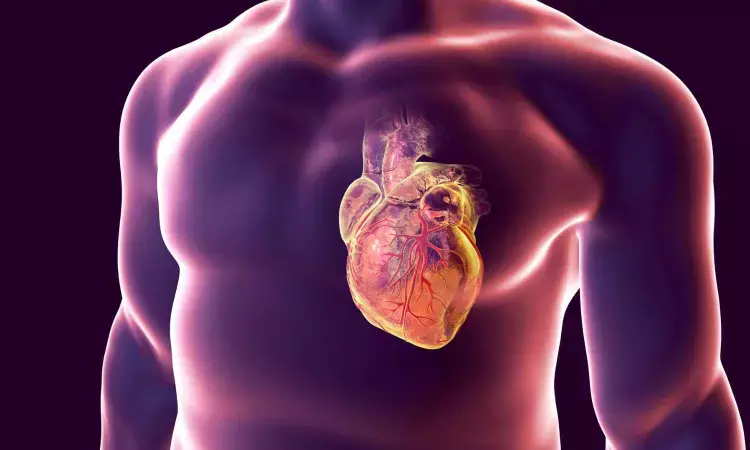- Home
- Medical news & Guidelines
- Anesthesiology
- Cardiology and CTVS
- Critical Care
- Dentistry
- Dermatology
- Diabetes and Endocrinology
- ENT
- Gastroenterology
- Medicine
- Nephrology
- Neurology
- Obstretics-Gynaecology
- Oncology
- Ophthalmology
- Orthopaedics
- Pediatrics-Neonatology
- Psychiatry
- Pulmonology
- Radiology
- Surgery
- Urology
- Laboratory Medicine
- Diet
- Nursing
- Paramedical
- Physiotherapy
- Health news
- Fact Check
- Bone Health Fact Check
- Brain Health Fact Check
- Cancer Related Fact Check
- Child Care Fact Check
- Dental and oral health fact check
- Diabetes and metabolic health fact check
- Diet and Nutrition Fact Check
- Eye and ENT Care Fact Check
- Fitness fact check
- Gut health fact check
- Heart health fact check
- Kidney health fact check
- Medical education fact check
- Men's health fact check
- Respiratory fact check
- Skin and hair care fact check
- Vaccine and Immunization fact check
- Women's health fact check
- AYUSH
- State News
- Andaman and Nicobar Islands
- Andhra Pradesh
- Arunachal Pradesh
- Assam
- Bihar
- Chandigarh
- Chattisgarh
- Dadra and Nagar Haveli
- Daman and Diu
- Delhi
- Goa
- Gujarat
- Haryana
- Himachal Pradesh
- Jammu & Kashmir
- Jharkhand
- Karnataka
- Kerala
- Ladakh
- Lakshadweep
- Madhya Pradesh
- Maharashtra
- Manipur
- Meghalaya
- Mizoram
- Nagaland
- Odisha
- Puducherry
- Punjab
- Rajasthan
- Sikkim
- Tamil Nadu
- Telangana
- Tripura
- Uttar Pradesh
- Uttrakhand
- West Bengal
- Medical Education
- Industry
High coronary calcium may predict CAD risk among people with no known risk factors

While high cholesterol, high blood pressure, diabetes and smoking are well known heart disease risks, not everyone who has a heart attack has them. In fact, previous research has shown that 14% to 27% of heart attack patients have none of these risk factors.
Now, a new study from researchers at Intermountain Health in Salt Lake City finds that these patients had one thing in common: they all tended to have high levels of coronary calcium.
Results of the new Intermountain study show that scans that detect this kind of plaque buildup should be considered as part of their standard care, even in the absence of the four standard modifiable risk factors, so that these patients can be diagnosed and treated before their first heart attack event occurs.
“Measuring coronary calcium could have a major impact on how we identify who is at risk for heart disease,” said Jeffrey L. Anderson, lead author of the study and research physician at Intermountain Health. “We need to go beyond just the four major modifiable risk factors because there are risk factors we don’t yet recognize or understand about what’s causing increased risk of heart attack in these patients.”
Findings from the study were presented at the American Heart Association’s Scientific Sessions 2023 in Philadelphia on Nov 11, 2023.
In the study, Intermountain researchers identified 429 heart attack patients who also had coronary artery calcium scans. Of those, 369 had standard modifiable risk factors (SMuRF), like a diagnosis or treatment of hypertension, hyperlipidemia, diabetes, and or smoking; and 60 did not (SMuRF-less).
Researchers examined these patients’ calcium artery scan scores, and then also major adverse cardiovascular events, like another heart attack, stroke, or death, at 60-days and long term.
Researchers found that SMuRF-less patients had high rates of, and higher percentile of, coronary calcium scores. They also found that 77% of these patients met their criteria for preventative therapy, like statins and/or aspirin. Patients with SMuRF, as expected, also had high CAC scores and percentiles. Outcomes were more favorable overall for SMuRF-less patients and for those patients with lower coronary artery calcium scores.
While coronary artery calcium scans are becoming more common and affordable, they’re still not part of guideline-directed standard of care.
“We’re missing about a quarter of people who are at risk for heart attack events because we’re still relying on just the standard risk factors,” said Dr. Anderson. “We haven’t been doing scans in low-risk patients that don’t have these common risk factors, but that may need to change given our findings, so that we can identify these seemingly low-risk patients who care not, and provide preventive therapy.”
Reference:
New study finds coronary calcium scores highly effective in identifying heart disease in people without any known risk factors, Intermountain Healthcare, Meeting: American Heart Association Scientific Sessions 2023.
Dr Kamal Kant Kohli-MBBS, DTCD- a chest specialist with more than 30 years of practice and a flair for writing clinical articles, Dr Kamal Kant Kohli joined Medical Dialogues as a Chief Editor of Medical News. Besides writing articles, as an editor, he proofreads and verifies all the medical content published on Medical Dialogues including those coming from journals, studies,medical conferences,guidelines etc. Email: drkohli@medicaldialogues.in. Contact no. 011-43720751


